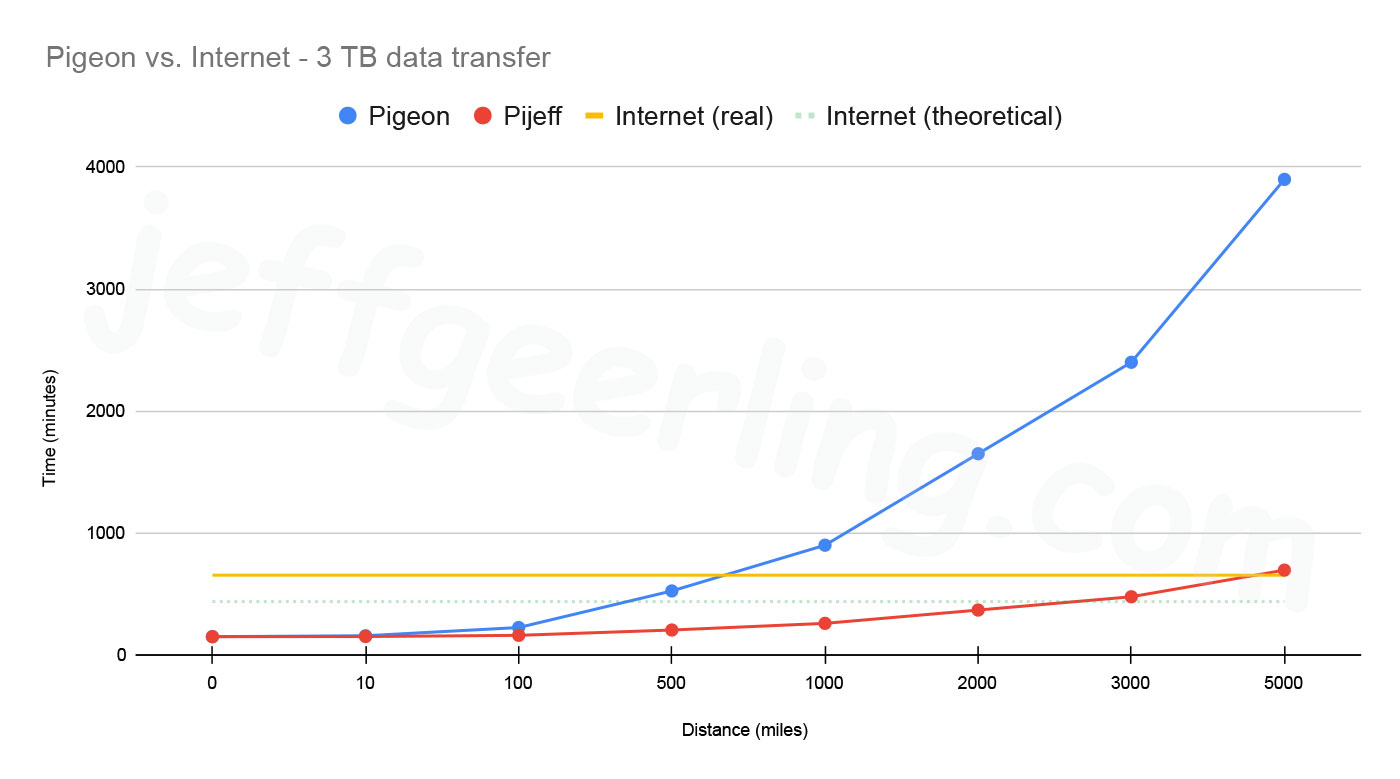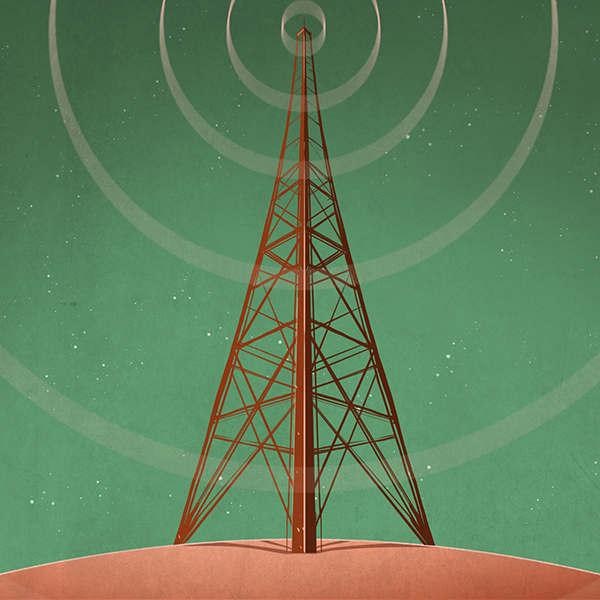[Jeff Geerling]’s latest project is for the birds — literally. Even though he has a brand new high-speed fiber optic internet connection, online backups of YouTube video projects still take hours. He decided to see if the conclusions from a 2009 in South Africa study still hold true today — that using carrier pigeons to send files can be faster than the internet. [Jeff] sets up an experiment to send 3 TB of data by homing pigeon a distance of one mile to establish a baseline. Next, [Jeff] sends the same 3 TB of data over the internet, and donning the cap of honorary pigeon, simultaneously embarks on a journey by air to his off-site backup service in Nova Scotia, Canada.
Never underestimate the bandwidth of a station wagon full of tapes hurtling down the highway.
[Jeff] points out that you also have to consider the transfer time of your files onto and from the pigeon-suitable memory cards. He jumped through several hoops to minimize that, but it still consumed 2-1/2 hours total. Trying to keep the comparison fair, he also spent a couple days optimizing his internet connection to eek out the best possible speed.

The results are interesting. In the 3 TB to Canada experiment, jet-assisted [Jeff] needed about seven hours, beating the internet’s eleven hours by a comfortable margin. The chart above shows the transit time for each method vs distance. As you can see, the internet only wins when you consider distances of thousands of miles. Homing pigeons win at distances up to a few hundred miles.
While not by air, Amazon’s AWS Snowmobile service uses a huge truck to carry exabytes of data from your site to their servers. If you want to try this yourself, first read up on RFC 1149, A Standard for the Transmission of IP Datagrams on Avian Carriers from 1990, and its modern IPv6 version RFC 6214. We also wrote a piece about another unusual application of carrier pigeons during WWI.

















Never underestimate the bandwidth of a station wagon hurtling down the highway carrying a load of tapes.
i never do
Try a motorcycle. It’s less likely to get stuck in congested roads by filtering between stopped cars.
Nope. Not going to happen. Bicycle when riding on a sidewalk – okay, but not a crotch rocket.
Driving a modern car at 55 mph (~90 km/h) you have a reasonably low chance of death in case of rear-ending someone, hitting a barrier or landing in a ditch. Hell, in some cases it’ll only end in minor bruises and shock from deployed airbags. Having a similar crash when riding a motorycycle at 55 mph you’ll be lucky if you end up in a wheelchair… and motorcyclists are not exactly known for their respect to speed limits.
That isn’t really true on many fronts, a motorbike can generally ride between the stuck traffic entirely on the road and very safely. Many motorcyclists are perfectly happy to ride as much within the speed limits as every other road user, only some are speed demon asking for trouble – and you get those in cars too…
And while motorcycles are most certainly more dangerous than a car it isn’t that bad. Folks come off a motorcycle all the time and if they were wearing the protective gear they may well be no more shocked and only slightly more bruised than the car driver at similar speeds. Heck some of the Motorcycle protective gear is really quite clever now with active airbags of its own! Its only when after that initial incident the rider is smashed into an immovable object or other traffic type stuff that the serious damage really happens.
I don’t have a horse in this race, I do have a buddy who is mr safety in regards to his motorcycle and got flipped over the handlebars when hitting a minor pothole … I have never been ejected from my car over such a thing
The definition of “stuck traffic” seems to be a bit fluid on the roads around me.
@KDawg Indeed, I never said they were accident proof safe though. Just that serious injury isn’t actually that likely, at least if you don’t go trying to earn the Darwin award. I expect your buddy could and maybe did get right back on the Bike and ride home.
within the frame of this article, i think the stakes are not the courier’s death, but rather lost packets / retransmission delay (vs. late packets)
LOL. I was just fixing to say the same thing. For reference, the actual quotation is “Never underestimate the bandwidth of a station wagon full of tapes hurtling down the highway.”
The fuller explanation is at https://www.reddit.com/r/mildlyinteresting/comments/20jlv3/never_underestimate_the_bandwidth_of_a_station/
Great bandwidth, rotten ping times.
Bandwidth of a sneakernet will always be larger then network, network speeds get faster, but drive sizes also get bigger. But latency is a different story…
Stopping by a pub might add horrible lag to sneakernet
It could also result in a massive amount of packet loss.
i’m not convinced about ‘always’. my fiber is on the “budget” plan of only 300Mb/s, and that’s as fast as the oldest working HDD in the house (i don’t know how it compares to the abysmal write performance of my new SMR HDDs either), faster than some of the ethernet, much faster than the wifi. it seems like the fastest would be to battery-backed RAM, which i happen to have in my cellphone…could really achieve some bandwidth filling that up and tossing it across the street to my neighbor, except it fills up over slow wifi.
at the highest end, i suspect you’re right. but at my house it’s been apparent for about a decade that the uplink is growing faster than many of the local transfer speeds. i just don’t ever need to copy anything at more than a small multiple of the speed of video playback, and it shows.
I remember something similar decades ago. Running while carrying floppy disks were faster than internet over dialup modem of the late 80s. Those were called sneakernet.
I calculated the bandwidth of a 747 full of DVD’s once and it was impressive and cheap compared to alternatives. For the pigeon I ask is it fully laden with eMMC die and how far does it go?
How about modern tape?
A pigeon can never be fully laden. For that, you need a swallow.
African or European?
It depends. Is the Coconut USB 2.0 or USB 3.0?
No, you have to account for the transfer speed of the media as well. He used an SSD based Samsung USB drive. The whole PCB with USB A connector. I would argue NVMe 2230 is enough of a standard to be a better choice practically. You can get a dock for one quite easily, and it is smaller, faster and lighter, also possibly cheaper (source, Just bought a 1TB SN740 for $40).
His test was for a YouTube video, so possibly USB thumb drives would be more relatable to a wider audience.
Interestingly, this is exactly how faster than light communication works with entangled particles. The secret to success is in ignoring the time it took to move the entangled particles to the distant location.
Considering the small size of Micro-SD at 1-TB apiece, one can compactly strap quite a bit onto a pigeon. Great for sneaking subversive video out of a dictatorial country.
Wouldn’t you want to sneak IN a subversive video? Maybe sneak out an exposé video?
Or not so great. You have to sneak the bird and possibly empty media in the opposite direction first. I doubt that someone ever succeeded in training a homing pigeon to be “dual-homed”.
> eek out the best possible speed.
Eek! It’s a misspelling of eke! ;)
If you have dense enough storage then tectonic plates are faster than fiber, but, there’s not much of a use case for it.
To share cat videos with Mole Men ?
Does anyone still remember this?
https://blug.linux.no/rfc1149/
This! Also, RFC 2549 (QoS) and RFC 6214 (IPv6).
I am very surprised Jeff did not mention any of that in his video.
How could you not mention Randall Munroe with
https://blog.xkcd.com/2019/08/26/how-to-send-a-file/ and
https://what-if.xkcd.com/31/ (When – if ever – will the bandwidth of the Internet surpass that of FedEx?)
Did no one mention RFC2549? https://www.rfc-editor.org/rfc/rfc2549
Old 1. April :)
It seems to me that at least one part of the equation is missing when comparing bandwidths. When transferring data over the internet one is presumably left with the original and a copy on the remote computer. If the same comparison were to be made with tapes or DVDs or flash memory etc, wouldn’t the time to copy the data from the source medium to the destination medium also have to be taken into account? I mean, copying an 8TB hard drive, for instance, is not an instantaneous event.
Have we already forgotten that a Giant African Snail is faster than ASDL lines?
https://improbable.com/airchives/paperair/volume11/v11i4/sluggish-data-11-4.pdf
My home connection transver 3tb in 18 minutes and 46 seconds. And If i upgrade connection to 10gbps it takes only 5 minutesand 37 seconds :) just for 90€/Mo :)
He assumes the Internet transmission time is constant at any distance. This isn’t true. It would only be true if one had a direct line.
THIS!!! I have this argument with my overseas customers all the time. Just because I have a 10Gbps uplink and they have a 10Gbps downlink, doesn’t mean that the Internet in between us doesn’t consist of bailing wire and used chewing gum.
In other worlds, Jeff assumed the best-case performance for the Internet and that actual real-world performance bolsters Jeff’s case even more.
It is a fairly reasonable assumption these days I would think (in the western world or at least across some of the more long term industrial nations anyway) that the slowest connection of the upload/receive end is the bottle neck – the backbone bandwidth tends to be rather impressive, it is the local area (especially the rural ones) local connections that are still comparative garbage. Though it is still possible to find places where the few trans-ocean cables are saturated etc, not all 1000mile distances as the crow flies will really be equally performant (for one thing its quite possible to connect to somewhere you end up bouncing off another server 1000 miles in the wrong direction first).
Not that I disagree, in the real world it won’t really be that constant with distance. Even in a theoretically perfect real world it wouldn’t be, as the connection speed may remain perfect but the added latency of establishing that initial connection will grow. However likely to be rather tiny variation compared to the time doing a big transfer takes anyway…
Now tell me, how can write a post on hackaday with such a flying rat?
It took me less than a minute to write this, and by the time I’ve stapled a piece of paper to such an animal it probably would have starved or broken a handful of bones.
Thinking of ordering scientific papers (on USB) from China the good old SEA way, for your Bachelor Work. Sorry Professor i ordered the papers Yesterday, i can start Reading and writing in three months. Procrastination on master Level.
It makes me wonder how much you could scale this. How much data can a Pidgeon carry? Are there other homing birds that can carry more? Falcon? Eagle? Albatross? What about other means? Someone mentioned a 747. What about an old Concorde? SR-71? ICBM? Then it makes me think about if we ever colonise Mars. What will be the best way then? SSDs on a 6 month long rocket journey might be faster than whatever they have currently.
As soon as you start to deal with space travel and current technologies the serious data dumping is likely to be speed of light point to point perhaps via multi-wavelength laser, so in effect the same as the Fibre links on the current internet – which will be virtually impossible to stuff enough data into our currently very slow rockets to match, even just getting to the Moon.
As for on Earth the SR-71 would be impressive bandwidth wise, and have relatively good latency. But I think you missed the current winner (assuming you could get permission) which would be SpaceX’s rockets – carry a huge payload and land anywhere on Earth in a relatively similar and rather short time. And then ready to fly back again in fairly short order too. Be a really really stupid idea really, but in terms of data transfer rates I don’t think it could be bested. Trying to figure out what would be the limiting factor, the mass of the Flash Storage or its volume is an interesting challenge too.
This could make for a very interesting comparison. A spaceX rocket would indeed be a very interesting for long distance. A fully laden cargo plane or a Jumbo like a 747-400 or A380 could win in the latency race though, if you are refueling the same plane and taking off again. Otherwise for short hops of 30km or less, an M777 Howitzer with a rocket assisted shell could transport multi-terrabytes of data within seconds. It would be UTP and not TCP though.